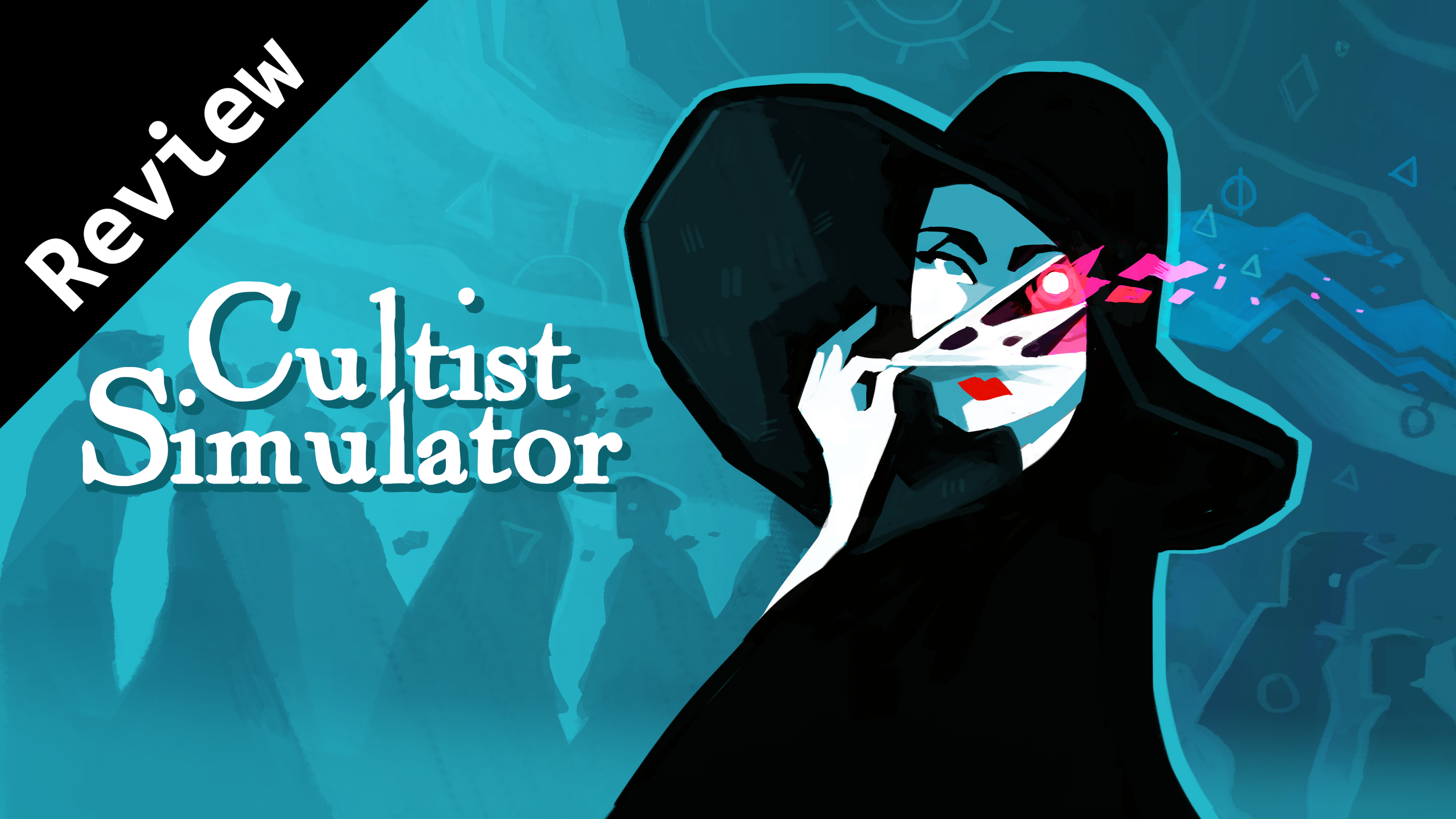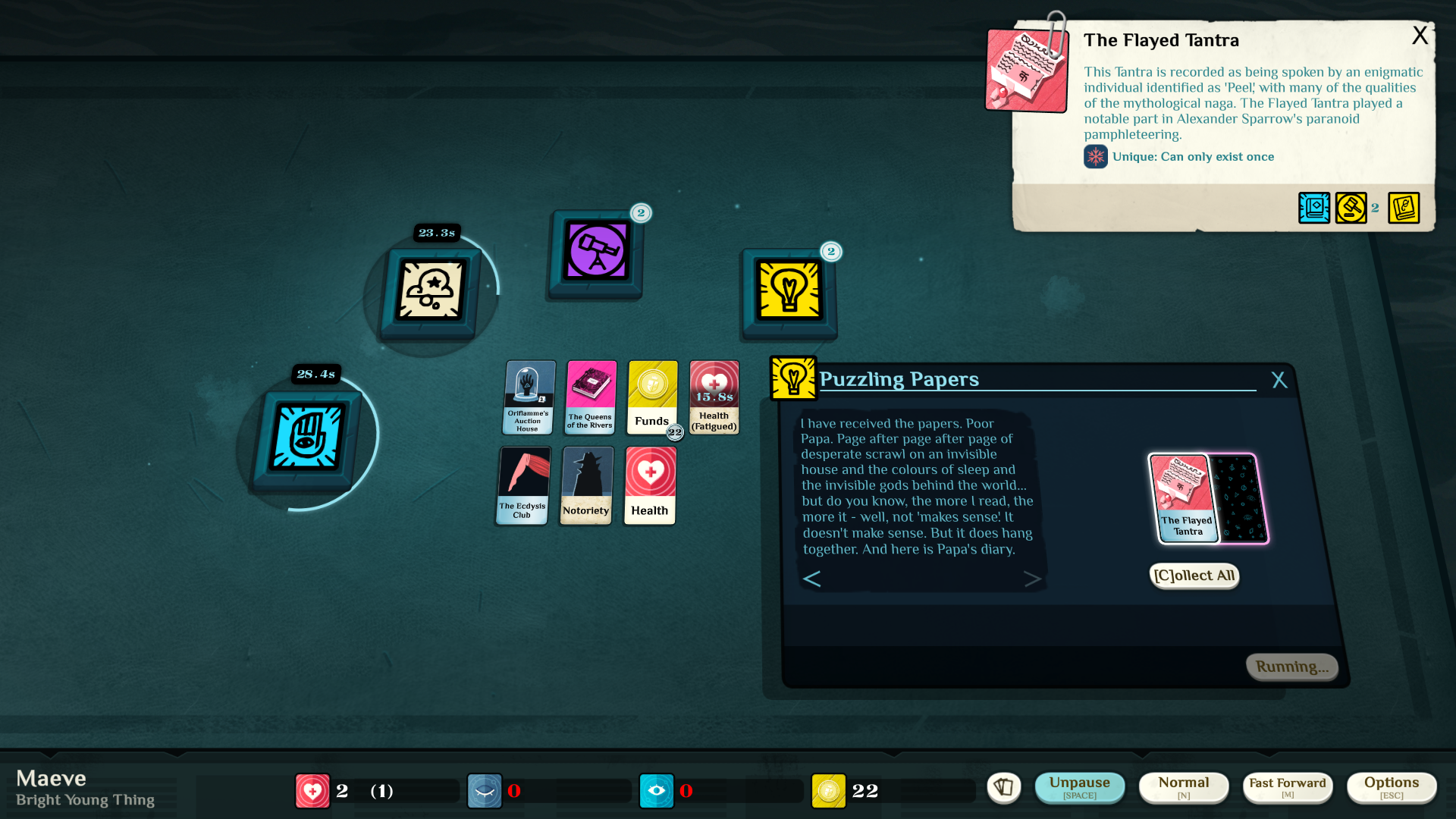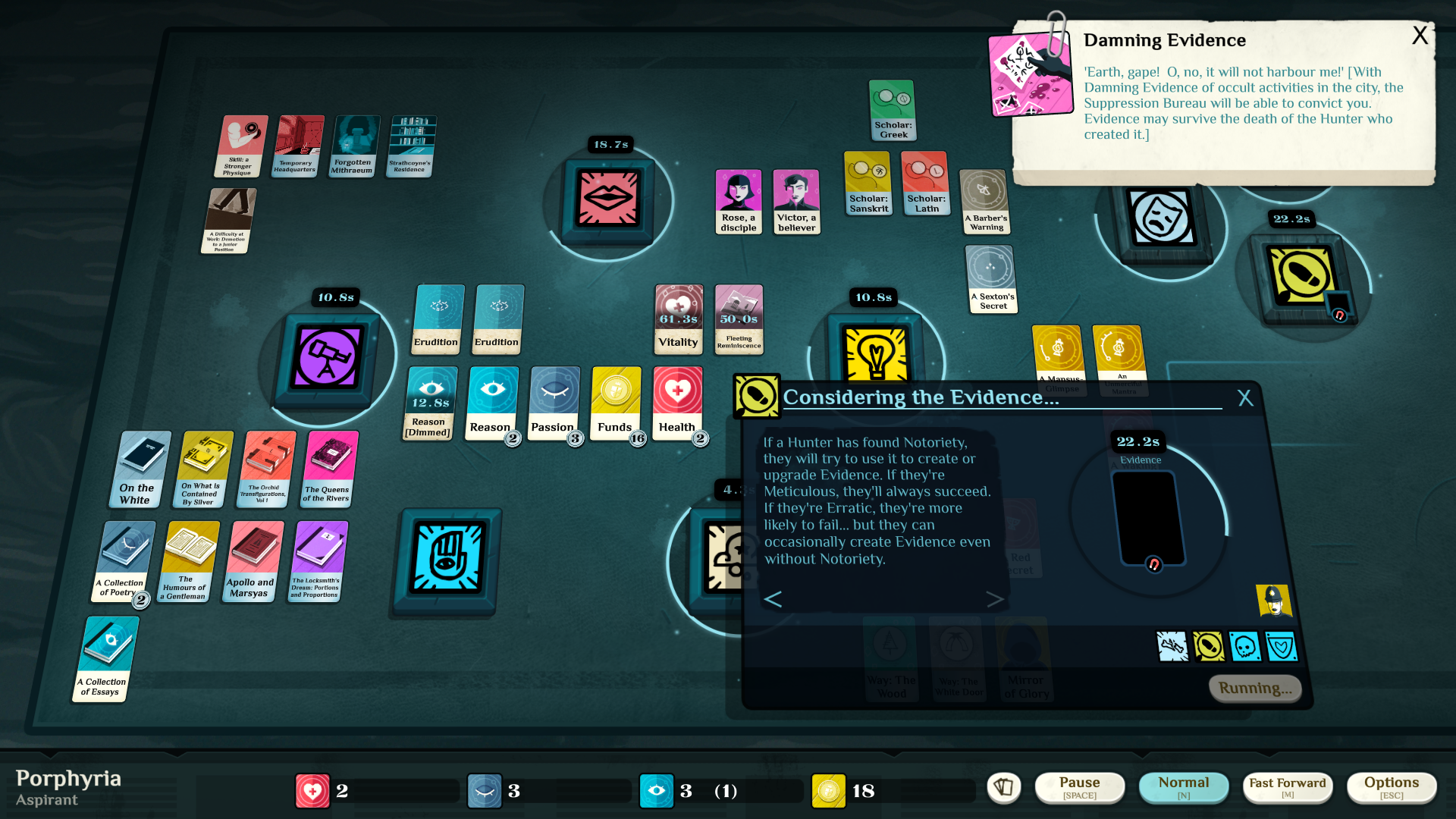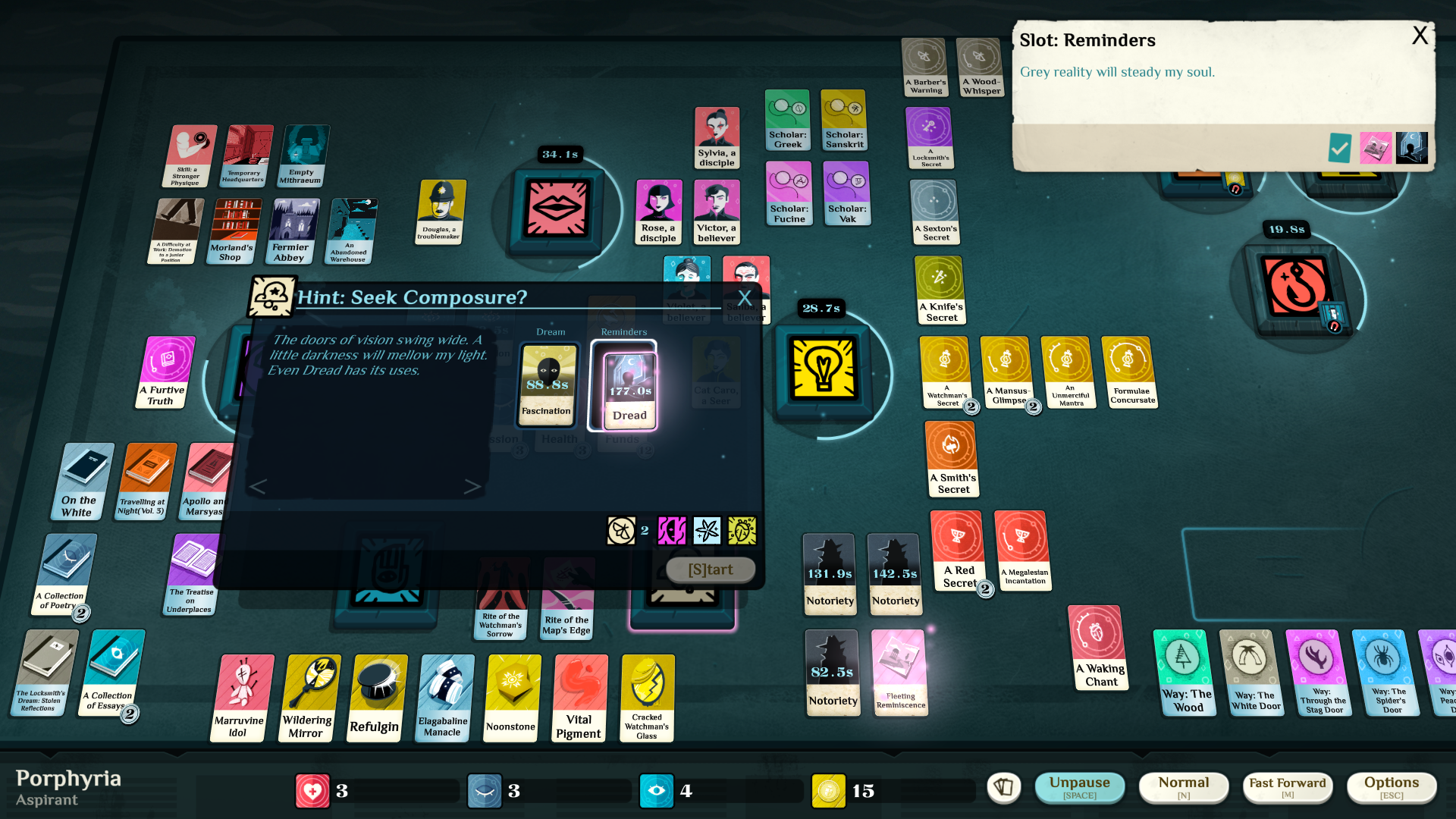
Review: Cultist Simulator
I caught covid, and since I’ve been completely confined to my bedroom to avoid spreading the plague to the people I live with, I’ve been searching for ways to fill my time.
One of them is by working on this blog, which I’ll talk a little bit more about at the end.
The main way is by playing lots of mobile games.
I can’t play my staggeringly large library of Steam games (which is a shame, because I’d just started to hyperfocus on them before I got unwell) because my desktop is in the living room, where I am not. Luckily for me, I have a Google Play Pass subscription, which means I get to play a whole bunch of high-quality mobile games at no extra cost and with no ads or microtransactions.
I’ve mainly played two games: one of them was a lovely wine-making management sim called Hundred Days, but the one I’m talking about today is called Cultist Simulator.
The premise
In Cultist Simulator, you start out as a lowly peon, trying to make ends meet in what is probably 1930s London (but is referred to only as “the Capital”).
After working at your menial job for a little while, however, you come across a mysterious bookshop that stocks texts detailing… otherworldly knowledge. You strike up a conversation with an acquaintance, and the two of you decide to found a shady society dedicated to the study of a particular fragment of this forbidden lore.

From there, the story branches significantly, and much of the fun of the game comes from experimentation and not knowing what will happen next, so I won’t go into it too much. Suffice to say, you find yourself embroiled in scandal, summoning otherworldly entites, conversing with gods in your dreams, narrowly avoiding descents into insanity or dispair… and all while being pursued by a series of detectives determined to put a stop to your nefarious schemes.
It’s beautifully Lovecraftian at times, and the creators have done a brilliant job getting you hooked in the story. The fact that the story is so branching means I still don’t have a full grip of the lore, and I’ve been playing it non-stop for the past couple of days; the story always feels bigger than the player.
And even if you reach one of the game’s many victory conditions, you still get a sense that there’s a lot more for you to learn, and a lot more for you to do. The replay value is great, and I wouldn’t be surprised if I picked it back up again today to start a new game.
The gameplay
The gameplay is very clever. It’s a beautiful example of how a relatively simple system can have significant complexity emerge out of it once different elements combine.
All gameplay takes place in the interactions between two types of object: cards and verbs. In the screenshot below, the verbs are the square-shaped boxes without text, and the cards are the smaller rectangles with captions.

Some cards decay over time, occasionally turning into other cards when they do. The verbs can have cards placed in them, and this is where the interaction with the game takes place. The main game loop consists of the player deciding on actions to perform within the game, placing cards within verbs to (hopefully) produce the cards they want.
However, there is one verb (and this is where the name starts to break down) that signifies time passing.
Every 60 seconds of game time (you can pause as much as you like, and move cards around freely), one card of your money resource is taken, and a new verb is created, signifying a certain “season” in the game.
For example, one such season is “A Season of Sickness”, which takes one of your health resource, and turns it into a card called “an illness”, which cannot be used as health until you spend time (and resources) healing.
The game, then, is surprisingly frantic — most of your time is spent in an almost-panic, watching dangerous cards like “dread”, “fascination”, or “notoriety” pile up and multiply across the board, unless you take specific actions to deal with them.
These combinations of cards aren’t just mechanical, either — a lot of skill and effort has been put into ensuring the mechanics reflect the lore of the game. Technically, I’m just moving cards across the board to get a result I want, but it genuinely feels like what I’m doing is visiting a shady nightclub to shake off the despair I’m feeling in the dark season, or moving my cult headquarters into a dingy, secret mausoleum to shrug off the authorities once they get too hot on my heels.

Replayability
Cultist Simulator is frustratingly replayable. Since the story is so branching, and there are multiple different victory conditions, no single playthrough will show you all the game has to offer, and you sit on the victory (or defeat, which is far more likely) screen wondering about what would have happened if you had taken a different path.
In addition to this, the developers had the genius idea to make your different playthroughs affect each other.
When you start a new game after finishing at least once, you are given a choice between three different “characters” to start as, each of which has a different starting condition, changing the lay of the game and which paths are easiest for you to take throughout.
In fact, I just looked online to research this, and discovered that getting one of the main victories in the game unlocks a special character with a more difficult victory condition, effectively a “New Game Plus” option. Looks like I’ve found what I’m doing for the rest of the day!
There’s also a bunch of DLC for the game, unlocking new starting characters and mechanics.
Basically, there is a lot of replayability, and in fact I don’t think it’s possible to really “get” the game after a single playthrough.
Which brings me on to…
Criticisms
I only really got the hang of the game after three or four full playthroughs (ending in defeat, or at least minor victory, each time), and after I started consulting the wiki.
I could talk for a long time about games that require online encyclopaedias to properly play (in fact I’m sure I will one day), but I think it’s quite a shame that I felt drawn to it here.
One of the main vibes of this game is uncertainty, and indeed one of the game’s loading screens tells you to experiment and try things out. But there were certain things within the game that made me feel I had to look something up to avoid frustration.
For example, one of the main mechanics in the game is the collection of “lore fragments”. These represent pieces of knowledge of varying intensities, and each corresponds to one of nine “principles”. There are rules for how these lore fragments can be “subverted” (i.e. converted) to different influences, which you may want to do in order to have more powerful fragments of the specific principle you’re after, but the game makes it difficult to know what those rules are at a glance.
You can select a fragment for study and the game will tell you what type it can be turned into, but there’s nowhere in the game to see the whole conversion chain at once. For this, I had to turn online.
Now, I did get around this in my most recent playthrough by arranging the cards on the board in such a way that it reminded me which ones converted into which other ones, and I feel like this is what the game “wants” us to do, but before learning this I just looked it up because the game was quite frustrating otherwise.
A lot of this is due to the fact that the mechanics are really complicated. I know I said it was very simple earlier: just two types of things, cards and verbs; but the rules for which cards you’re allowed to put into which slots is really complicated and difficult to learn.
Many times in the game I planned to do a particular thing, but I discovered too late that I had misremembered how something works, and had now dug myself into a hole and had to backtrack and do a lot of cleanup.
I don’t think this is a good state for a player to be in, and is more frustrating than just difficult. This is largely what led me to finding the wiki and keeping it to hand for my next playthrough.
In fairness, the wiki definitely added to my experience rather than taking away — many games that need a wiki to play (I’m looking at you, factory games) can get a little annoying having to flick between tabs to plan out simple things, but in Cultist Simulator it almost feels more like I’m being the cultist, checking my infernal notebook to see what I must do next!
I also did really badly in my first few playthroughs, but I found this more frustrating than a learning experience. Having said that, though, the game hooked me straight into the next playthrough by dangling those tempting new characters right in front of me, so it does a good job of showing you the value of learning by doing! It’s just a shame that the first playthrough had me looking for a difficulty adjustment in the menus (there isn’t one, by the way, and I think that’s the correct design choice here).
Conclusion
Overall, Cultist Simulator is a good game! The graphics and writing, which I didn’t delve into very much in this review, are great, and couple with the deep worldbuilding to create a really immersive experience.
The game has been ported very well to mobile (although it would definitely have been a better experience on a larger screen), with very few UI annoyances. The text was small at times, but I did spot a UI scaling option in the menu (which I didn’t feel I needed to use).
So, for my total scoring… wait, what’s this!?
A Season of Surprise Devlogs
I’ve wanted to review video games on this blog for a long time, and the main thing stopping me was quite stupid — I wanted there to be a cool little panel that shows my breakdown of scores for a particular game, but since I’ve written this site myself, I’d have to create such a panel myself, from scratch.
And since my day job is teaching people about HTML, CSS, accessible design, etc, I kept procrastinating doing even more of that in my spare time.
But, since I’m locked in my room with covid, there’s no better time than now to dedicate a day to producing something that I know will bring me joy in the long run.
I present to you… the review box!
Cultist Simulator
- Look and feel 8
- Immersion 9
- Gameplay 7
- Learning curve 6

I plan on writing more game reviews, because it’s something I feel quite strongly about and have lots of opinions on, so it’s nice to have worked on a cool little box!
I’ll almost certainly make some tweaks to this — I’m not a designer, and I haven’t yet made completely sure that it’s properly responsive and accessible, but it’s a nice start.
Thanks so much for reading, and I hope you give Cultist Simulator a go!